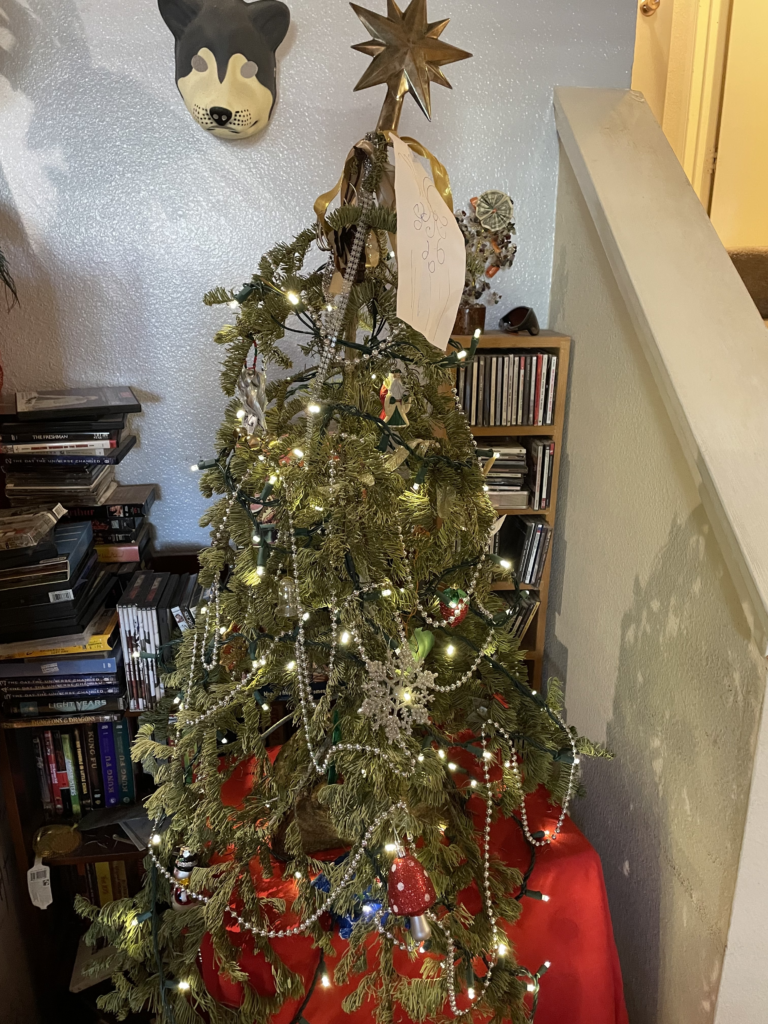Most people reading this title will assume it’s a trick question. “It’s aesthetics,” you’ll say. “It’s a personal opinion.” When to take down a Christmas tree is a thing, though.

New Year’s Day?
I know some people who swear the right time is on New Year’s Day. Their argument is that it’s a new year. You want it up for New Year’s Eve, of course, since that’s a big party, but, somehow, by New Year’s Day it feels like it’s not Christmas. It’s the next holiday.
January 2nd?
A variant of this is that the “holiday season” ends when New Year’s Day ends. New Year’s Day is the last holiday of that time of the year, later than Hanukah, the winter solstice, Christmas, Kwanza, etc. And, anyway, you’re probably hungover New Year’s Day, so why burden yourself with dragging a tree out in to the cold to dispose of it?
January 7th?
I know some people who understand the Christmas holiday as a 12 day holiday that goes from the birth of Jesus on 12/25 to the coming of the Magi on 1/6, which is known as Twelfth Night. The song “A Partridge in a Pear Tree” refers to this. The first gift is on 12/25 and the gifts continue up through 1/6. It doesn’t identify those dates specifically, but I think people knew what it meant when that song was composed. In fact, it’s part of a larger folklore of gift songs that run along similar lines. By that logic, the tree should go up on Christmas Eve (which is still part of the holiday period, by virtue of the fact that it’s the “Night Before Christmas”) and comes down on 1/7.
1/31?
My answer is no later than 1/31. I’m Wiccan and my tree isn’t a Christmas tree, but rather a Yule tree. Wiccans typically observe Yule on the winter solstice, but I sort of think of secular Christmas as being within Yuletide. Yule, for me, is bracketed by two other Wiccan holidays: Samhain on 11/1 (Samhain Eve is 10/31, which is Halloween), and Imbolc on 2/1. Samhain is the onset of the dark part of the year, when we honor the Mighty Dead. Imbolc heralds in early spring. In temperate climates, it’s when the snows are often thawing. In the northern hemisphere, the days are noticeably longer than they were at the winter solstice. So, for me, it would stop making sense to have my Yule decorations (including my tree) up by Imbolc. By that reasoning, my tree should come down no later than 1/31.
Does it matter?
Most rational people, and even many religious people would say, “no!” Why should it? It’s cultural, not scientific. There’s no mathematical algorithm to define this. “How nonsensical?” you say. “Just take your tree down when you feel like it!”
Not so fast! I think there’s something to what people are talking about. I’m not claiming that there’s any sort of objective reasoning to this question. Instead, I’ve been thinking deeply about what culture means to us.
Tradition is important, in some mysterious way. It’s more than just individual preference influenced by others. It’s not merely, “I like to take my tree down on Jan 7th, because my friend Diana does.” Tradition brings us together in ways that are more than just folksy charm. It’s important to be brought together, because I believe our sense of ethics comes from our conception of togetherness.
Why isn’t there one answer, then? Why isn’t tradition one thing? In fact, tradition varies from place to place, family to family, and person to person. I think this is because we don’t just use tradition to bring us together. We also use it to define certain groups that, when all are mapped out, end up being the whole. Families will assert their own particular customs within the overall bell curve of the holiday, such as whether to put an angel, a star, or something else on top. Localities will have their own variations on tradition, as well. I think this is to differentiate various groupings of people, while still signaling that those groups are part of a larger whole. Family and community are important, and so are the uniqueness of their traditions. There’s room for personal preference, too, because each of us assert ourselves as significant individuals within the group. So we may even have our own favorite ornament that just has to be nice and visible on the tree. I know, in my family, we all have our favorite Christmas music and we all want to make sure our album gets played.
Tradition simultaneously brings us together and allows individual and sub-group expression. It provides landmarks to our mind’s eye, by which we can visualize the terrain of everybody as one, various communities within that oneness, and finally ourselves as individuals within those communities.[1]
Cultural tradition is not monolithic, but rather a dance. We dance with each other via the dance steps of tradition and individual taste, asserting our independence from the rest of humanity one moment, affirming our commitment to the common good the next, and affirming our membership in our various communities, in between.
My Forthcoming Book
Look for my book, “The Religion of Good: a Wiccan’s Theurgic Guide to Ethics for Individuals of Any Religion or None”, which provides spiritual guidance on ethics, forthcoming from Concrescent Press.
—
[1] I don’t mean to imply that everybody in the world should necessarily do anything related to Christmas, Yule or the like. I recognize that our world has many cultures. I’m simply observing how culture binds us together. Some traditions have become almost worldwide, though, like New Year’s fireworks. I hope that everyone in the world can come together, some day, in a universal community of Earth. Maybe the first step is to appreciate the great variety of cultural traditions around the world.
